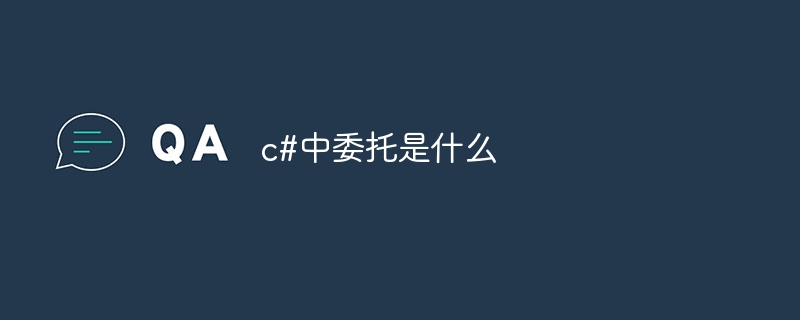What is delegation in c#
A delegate in C# is a type-safe pointer that points to a method that can be called. Its advantages include callability, code reuse, and asynchronous programming. The syntax of a delegate is public delegate void DelegateName(params Type[] parameterTypes), which can be used by declaring delegate variables, pointing to methods and calling the delegate. In the example, the delegate CalculationDelegate points to the method Add and is used to calculate the sum of 10 and 20.

The role of delegation in C
#A delegate is a type-safe pointer in C# that points to A method that can be called. Delegates can pass blocks of code as parameters, enabling callback mechanisms and other advanced design patterns.
Advantages of delegation
Delegation has the following advantages:
- Callability: Delegation can be like a method is called without knowing the method being pointed to.
- Code Reuse: Delegates allow code blocks to be passed to other objects, thereby achieving code reuse and decoupling.
- Asynchronous Programming: Delegates play a vital role in asynchronous programming and are used to handle completed method callbacks.
Syntax of delegation
The syntax of declaring a delegation is as follows:
1 |
|
Among them:
DelegateNameis the name of the delegate.params Type[] parameterTypesSpecifies the parameter type of the delegate method.
Use of delegates
In C#, you can use delegates in the following ways:
- Declare delegate variables :
1 |
|
- Pointing method:
1 |
|
- Calling the delegate:
1 |
|
Examples of delegates
The following example demonstrates the use of delegates in C#:
1 2 3 4 5 6 7 8 9 10 11 12 13 14 15 16 |
|
In this example, delegates CalculationDelegate is used to point to method Add, which is then used to calculate the sum of two numbers.
The above is the detailed content of What is delegation in c#. For more information, please follow other related articles on the PHP Chinese website!

Hot AI Tools

Undresser.AI Undress
AI-powered app for creating realistic nude photos

AI Clothes Remover
Online AI tool for removing clothes from photos.

Undress AI Tool
Undress images for free

Clothoff.io
AI clothes remover

Video Face Swap
Swap faces in any video effortlessly with our completely free AI face swap tool!

Hot Article

Hot Tools

Notepad++7.3.1
Easy-to-use and free code editor

SublimeText3 Chinese version
Chinese version, very easy to use

Zend Studio 13.0.1
Powerful PHP integrated development environment

Dreamweaver CS6
Visual web development tools

SublimeText3 Mac version
God-level code editing software (SublimeText3)

Hot Topics
 1392
1392
 52
52
 Active Directory with C#
Sep 03, 2024 pm 03:33 PM
Active Directory with C#
Sep 03, 2024 pm 03:33 PM
Guide to Active Directory with C#. Here we discuss the introduction and how Active Directory works in C# along with the syntax and example.
 C# Serialization
Sep 03, 2024 pm 03:30 PM
C# Serialization
Sep 03, 2024 pm 03:30 PM
Guide to C# Serialization. Here we discuss the introduction, steps of C# serialization object, working, and example respectively.
 Random Number Generator in C#
Sep 03, 2024 pm 03:34 PM
Random Number Generator in C#
Sep 03, 2024 pm 03:34 PM
Guide to Random Number Generator in C#. Here we discuss how Random Number Generator work, concept of pseudo-random and secure numbers.
 C# Data Grid View
Sep 03, 2024 pm 03:32 PM
C# Data Grid View
Sep 03, 2024 pm 03:32 PM
Guide to C# Data Grid View. Here we discuss the examples of how a data grid view can be loaded and exported from the SQL database or an excel file.
 Patterns in C#
Sep 03, 2024 pm 03:33 PM
Patterns in C#
Sep 03, 2024 pm 03:33 PM
Guide to Patterns in C#. Here we discuss the introduction and top 3 types of Patterns in C# along with its examples and code implementation.
 Factorial in C#
Sep 03, 2024 pm 03:34 PM
Factorial in C#
Sep 03, 2024 pm 03:34 PM
Guide to Factorial in C#. Here we discuss the introduction to factorial in c# along with different examples and code implementation.
 Prime Numbers in C#
Sep 03, 2024 pm 03:35 PM
Prime Numbers in C#
Sep 03, 2024 pm 03:35 PM
Guide to Prime Numbers in C#. Here we discuss the introduction and examples of prime numbers in c# along with code implementation.
 The difference between multithreading and asynchronous c#
Apr 03, 2025 pm 02:57 PM
The difference between multithreading and asynchronous c#
Apr 03, 2025 pm 02:57 PM
The difference between multithreading and asynchronous is that multithreading executes multiple threads at the same time, while asynchronously performs operations without blocking the current thread. Multithreading is used for compute-intensive tasks, while asynchronously is used for user interaction. The advantage of multi-threading is to improve computing performance, while the advantage of asynchronous is to not block UI threads. Choosing multithreading or asynchronous depends on the nature of the task: Computation-intensive tasks use multithreading, tasks that interact with external resources and need to keep UI responsiveness use asynchronous.




